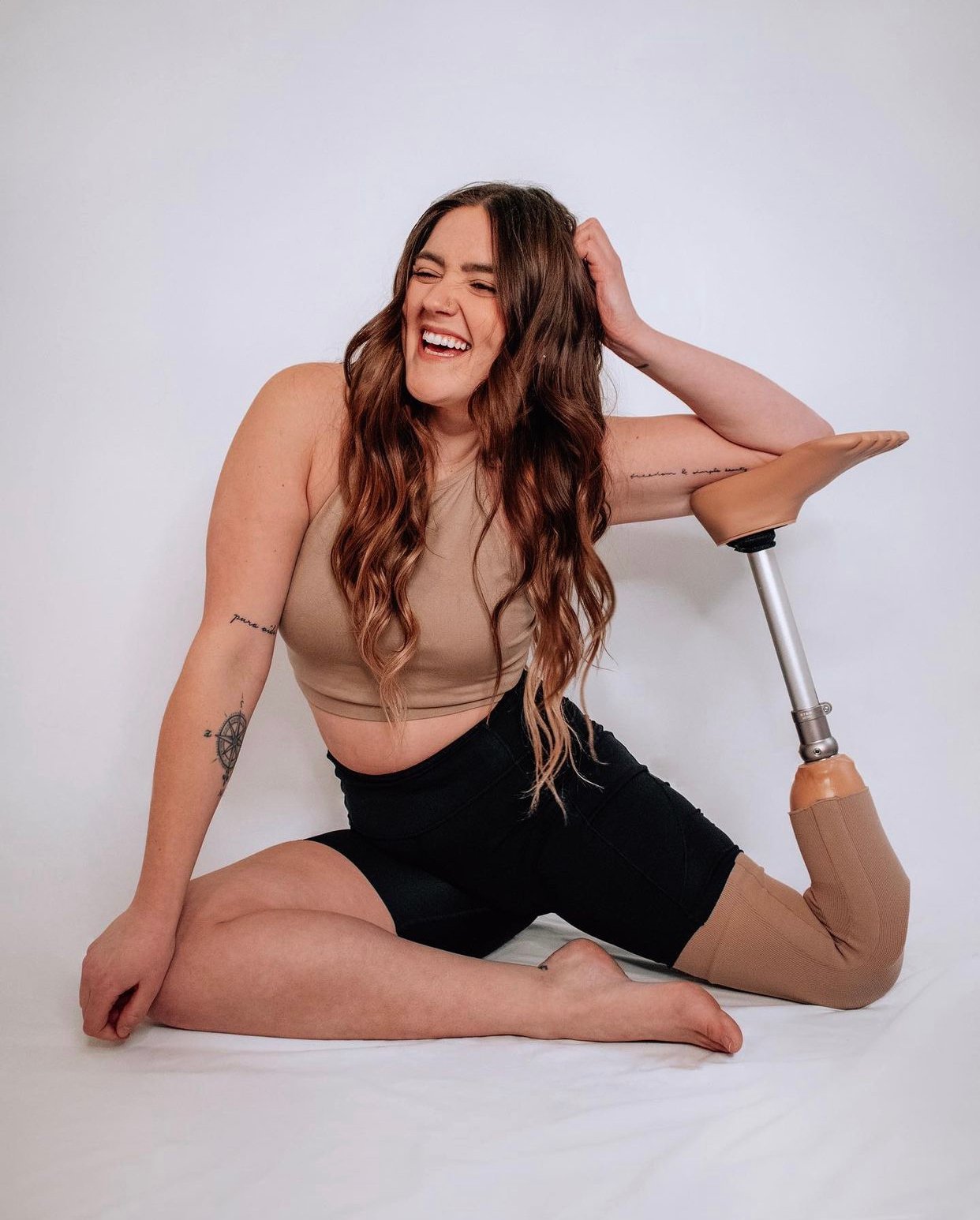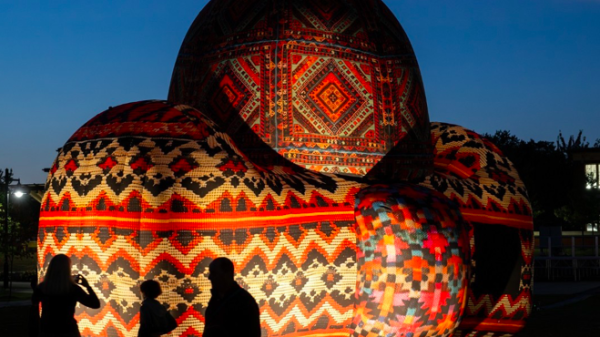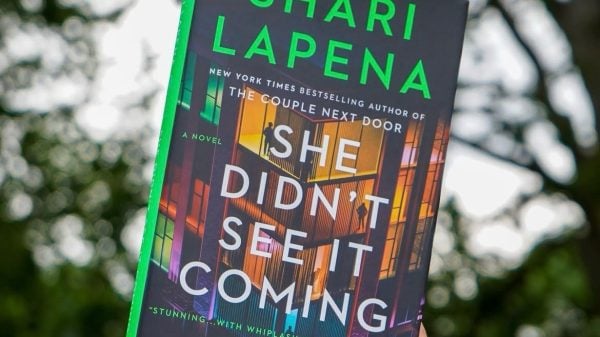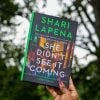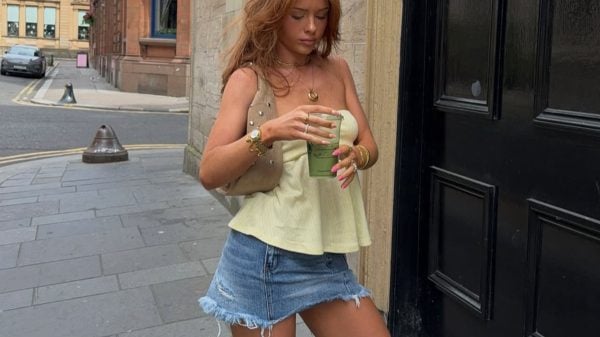As a group of women working towards common goals for STYLE Canada‘s brand and business, we understand the value of peer support in the workplace. So, after our last Supper Club at Soho House, we decided to bring like-minded women in business together and feature them in an ongoing series: #LeadingLadies. Scroll to learn more about Canadian athlete, amputee, model and advocate for body inclusivity Allison E. Lang in an exclusive interview with STYLE Canada’s Digital Editor, Anastasia Barbuzzi.
*BONUS! Hang out with us on Instagram this evening for a special live interview in honour of Limb Loss and Limb Difference Awareness Month with Allison E. Lang, conducted by STYLE Canada’s Digital Editor, Anastasia Barbuzzi. Tap or click here to join at 7:00 p.m. (EST)!

AB: If you were introducing yourself to someone for the first time, what would you tell them?
AL: You can call me Allie! I’m a sarcastic goofball that loves to go on spontaneous adventures and meet new people. They’re often surprised that I don’t tell strangers about my leg right away. I normally wait for them to notice and ask me about it because I personally don’t think of it as a distinct trait. I have many interesting quirks before I’d classify myself as an amputee. However, it is like the icing on the cake – the added layer of flavour that makes me different and has moulded me into who I am today.
AB: What is your greatest achievement over the past decade?
AL: It’s difficult to pinpoint my greatest achievement over this past decade. There are many small victories that I am very proud of. Although, if I had to pick one, I’d say backpacking 29 countries as a solo female traveller is pretty cool. My goal is 30 before 30, so hopefully I can sneak one more in in 2 years.
AB: What obstacles have you overcome to get to where you are today?
AL: Where do I start? From birth, I was pitied by doctors and even some family members. I was seen as a burden and my grandparents worried about how I’d ever find a husband, which isn’t the main purpose of life. That’s actually the least of my priorities right now.
I was born with my tibia, but not my fibula below the knee of my left leg. This resulted in me having to get revision surgeries done on the end of my little leg roughly every three years to trim the bone down so it wouldn’t pierce through my skin. I don’t talk about these surgeries a lot because the physical pain was excruciating – I still have nightmares about it. You could say it scarred me, literally.
I’m pretty vocal about being a victim of bullying in school, both emotionally and physically. It got so bad that I had to switch schools. I would come home crying everyday and say things to my parents like ‘I don’t want to be alive anymore’ or ‘Why was I made this way?’, which no child should ever have to experience.
In my teenage years, I was rejected by boys because of my leg once dating became a thing. This affected my confidence drastically with the fear of being rejected by anyone (even friend groups) and resulted in me hiding my leg from others until my early twenties.
There are so many other events that I can think of where I had to overcome being ostracized or isolated because of my disability. However, I wouldn’t change anything because it’s truly made me stronger and I believe it’s formed me into the strong advocate I am today. I’m using my traumatic experiences to educate others about how to be more inclusive and accessible. I’m also using them to help people implement the proper representation of disabled peoples. It’s insane to reflect back to where I started in comparison to where I am now. I still can’t believe it.
“I was seen as a burden and my grandparents worried about how I’d ever find a husband, which isn’t the main purpose of life. That’s actually the least of my priorities right now.”
AB: On your website, you say that ‘your obstacle is your opportunity’. What do you mean by this?
AL: When I was a teenager, I desperately needed something to build my confidence because I was suffering so much internally. I resorted to writing positive words of affirmations on the floor-length mirror I had in my bedroom at my parents house. It started with simple things like ‘you have a great smile’ or ‘your family loves you’, but then it evolved into ‘your obstacle is your opportunity’. This expression to me is so powerful because it was the major mind shift I needed to happen in order to start living a fulfilled life. I hid who I was for so long, so I started viewing my difference and all my obstacles that came with it to change the narrative by educating others through my personal story.
I’ve been asked before if I wish I was born with two legs and my answer used to be yes, but now it would be a hell no. I have had such amazing opportunities that I wouldn’t have had otherwise if I were born with two legs, like competing internationally with Team Canada’s Women’s Sitting Volleyball Team or being a panelist speaker at The BodCon on the topic of body positivity and fitness.

AB: You created the hashtag #hoparoundtheworldwithme to inspire people to follow you on your travels. Some people may look at yours (and other amputee’s) realities and think of how much it must hold you back. How do you push forward and stay so positive?
AL: I thought I was so clever by making that hashtag! I wouldn’t say it ever took off but it connected me to the people that mattered most at that time. I got messages on Instagram from parents of amputees stating, ‘Wow, I was worried about whether or not my baby would be able to lead a normal life. Seeing you travelling has given me the comfort that they’ll end up fine’. This was the most fulfilling feedback I ever received through that hashtag and that is what motivated me to continue sharing my journey.
It’s taken years of practice and I’m continuously practicing to stay positive. It’s honestly like a muscle you have to warm up and workout every single day or you’ll lose it. I’ve created a daily routine that incorporates gratitude where each morning while I have my coffee, I’ll write down three things I’m grateful for. I find it starts my day on a positive note and if I’m feeling down in the dumps that day, I’ve just tricked my brain to find the good. Fake it til you make it is what I say!
AB: As a successful model, you represent a severely underrepresented group of people in the industry. How do you stay confident and promote the presence of other amputees?
AL: I don’t think I would have survived in this industry even a few years ago. I’m stronger now with tougher skin so I don’t let every little thing personally affect me. My dream was never to be a model, I just wanted to be a role model for younger amputees because when I was growing up, no one in magazines or on TV looked like me. If they did, they were an able-bodied person playing a disabled character, which is frustrating because they would never truly depict what living with a disability looked like. Disabled models and actors exist and should be hired.
There have definitely been some hurtful things said to me since I started modelling. For example, that companies aren’t looking for ability diversity, just colour diversity for their advertisements. This frustrates me because I support the BIPOC community and I want there to be as much diversity as possible, but diversity shouldn’t just be one single box to check. There’s an abundance of different types of bodies that are unrepresented and it needs to be normalized.
At the end of the day, in everything I do, I hope to do it in a positive light. My goal is to build strong relationships with brands whose values align with mine in regards to inclusivity, diversity, and accessibility. These relationships are the ones that I want to focus on and hopefully others will learn and follow.
“…Diversity shouldn’t just be one single box to check. There’s an abundance of different types of bodies that are unrepresented and it needs to be normalized.”
AB: Who is your style/lifestyle inspiration?
AL: Paola Antonini. She is a Brazilian model, advocate, and left above-knee amputee. She lost her leg to a drunk driver but hasn’t let that stop her. She has modelled for huge companies to positively represent the disabled community and works closely with children that have lost limbs in accidents. Paola is not only my lifestyle inspiration but also my style icon. She matches her prosthetic legs to her outfits. She must have a leg in every colour of the rainbow. It’s such a statement and makes her outfits appear so fun and vibrant. Whoever said prosthetics have to be boring is dead wrong.
AB: You juggle so many different things in your career as an influencer, designer, hobbyist, etc. How do you do it all? What keeps you sane?
AL: I want to be super transparent and say that sometimes I can’t do it all, I’m only human too. I feel blessed to have had such a great response to the work I’m doing over this last year especially, so I remind myself to work hard now and it’ll pay off later. I’ve always been someone who likes being busy, I can’t sit still and blame this on my ADHD, so I’d rather have too many things to do than not enough.
My friends and family keep me sane, I have them to thank. I actually recharge when I’m with people, which is surprising to most because I’m always talking to someone for work. Another thing that keeps me sane is doing something I love like taking photos, writing poetry or planning my next trip.

AB: What do you love most about the work you do?
AL: I have chills because what I love most about the work I do is meeting people. I’m proud to say that I connect quite quickly with others. I imagine it’s because I’m not afraid of being vulnerable which creates a safe space for others to open up to me. That fuels my passion! It doesn’t matter if they’re an amputee or not, we all have insecurities that present themselves in different ways, so why not bond over it?
SC: The Amputee Coalition created Limb Loss and Limb Difference Awareness Month to honour your community and educate others about what it’s like to live with limb loss and limb difference. How do you do that through your platform?
AL: My platform started as a travel portfolio for myself. I loved travelling and would document all the places I was visiting, but when you’re on the beach in a bikini, it’s difficult to hide your legs. So, I had people commenting or sending me messages about how if I could backpack through Europe, they could too. In theory, this was a positive response, but underneath it hurt because the phrasing made me feel as though I wasn’t expected to be able to do this because I am disabled.
Fast forward to now and I’m extremely open online. I post photos with my unfinished (post) prosthetic and share mini blog-like captions that unpack my feelings about living in an ableist world. I’ll address things like never wearing dresses in public because society taught me that my leg was never feminine enough because I couldn’t wear heels or appeared too edgy. I try to highlight that asking questions is encouraged, we’d prefer them to assumptions made about the disabled community.
I write a lot about the negative body image I had for so long and my captions surprisingly resonated with a lot more than just the disabled community. I get private messages from all types of people going through the same thing. We’re all human with bodies that deserve respect no matter the size, shape, colour, sex, ability, etc.
AB: Why should people know about what it’s like to live with limb loss and limb difference?
AL: It’s important to know about what it’s like because it will create a world of acceptance and inclusion through understanding and patience. Not all limb loss or limb differences look the same, we’re all unique individuals with a unique story. There are lots of different types of limb differences; I’m a congenital leg amputee which means I was born missing my leg from birth.
I want to emphasize that limb loss or limb difference isn’t something to pity. I am proud to be an amputee. I may have my own experiences and challenges, but my story doesn’t reflect all of the disabled community. I follow others on social media with different disabilities than my own so I can continue learning from them as well and I encourage everyone to do the same.
Exposure is everything. The more that our voices are heard, the more accepting and accessible people and places will become. This is why I’m fighting proper representation in the media. No one is more fit to share the narrative of a character with a disability than one who has actually lived with it.
AB: When do you feel your strongest?
AL: While hiking. It’s my favorite outdoor activity! I grew up in Alberta, so I would drive to the Rockies as often as I could just to conquer a new mountain trail. Honestly, nothing can replace the feeling I get when I reach the top of a lockout and look down to where I started. That is when I feel my strongest – moving the body I was given.
AB: Who or what has been a strong influence in your life?
AL: Hands down, my mom. She has been my rock. From the moment I was born when the doctors said there was something wrong with me, she responded, ‘If her heart and lungs are fine, there is no problem’. She’s a strong feminist and taught me to defend myself and stood up for me when no one else would. I recall this one time when I was being severely bullied in school, she went to the principal’s office to get them to do something about the bullying and the principal said, ‘Oh you know, girls will be girls…”. My mom responded with, ‘How do you think the news will react if I call them up saying that your school is tolerating bullying?”. After that day, something was finally done to protect me on the playground. This has positively influenced me to stick up for others that are going through difficult times. My mom has candidly taught me not to take shit from anyone, in a respectful way.
AB: What advice would you give your 16-year-old self?
AL: Stop caring what others may think. Their opinion of you doesn’t matter.
I used to obsess about what others would think when they saw my leg, when in reality they hardly ever noticed because no one is paying as much attention to you as you think. Especially at that age, everyone is so caught up in themselves and they are not observant. So, do what you want and what makes you happy. After all, you weren’t born to blend in. You were born to stand out.
AB: If there’s one message you want to send to your audience, what is it?
AL: Do not let anyone else decide how you show up in the world.

Tap or click here to follow Allison’s journey on Instagram!


